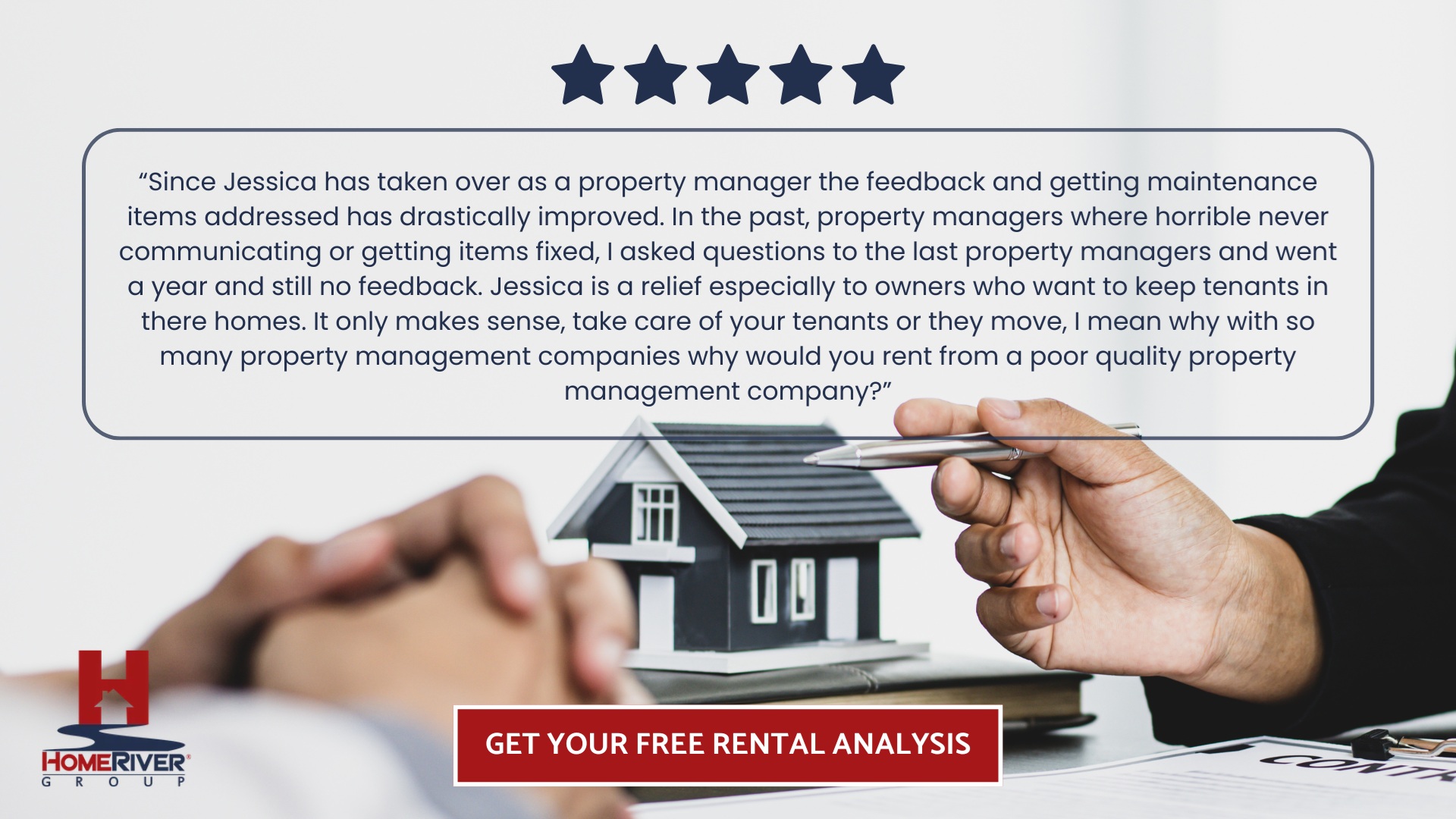
What Is A Property Management System? Tools That Simplify Property Management
With a commitment to providing exceptional service combined with local expertise, HomeRiver Group utilizes state-of-the-art property management systems to ensure that your property is a valued priority.
In today’s fast-paced real estate market, efficient property management solutions are vital for renters and buyers. A Property Management System (PMS) is a key tool for modern property management companies like HomeRiver Group, simplifying the complexities of managing residential and commercial properties. This innovative software centralizes operations, streamlines asset management, enhances reporting, and provides local market insights, offering significant benefits in today’s real estate landscape. Understanding its value is crucial for staying competitive in the industry.
This article will explore the key functions and benefits of a Property Management System (PMS), how it simplifies property management tasks, and why it’s vital for property managers and owners looking to streamline operations and improve tenant satisfaction.
The Evolution Of Property Management Software
The landscape of property management has undergone significant transformations over the years, transitioning from manual, paper-based systems to sophisticated, digital solutions. This evolution mirrors the broader technological advancements that have reshaped every aspect of our lives, particularly how we manage and interact with real estate.
The Transition From Manual Systems: Property management began with paper-based systems, relying on physical documentation and face-to-face interactions for lease agreements, rent collection, and maintenance requests.
Early Property Management Software: The introduction of basic software digitized essential functions, such as lease and payment records, but these systems often needed to be clearer and required significant manual input.
Advancements With Cloud Computing: Cloud computing and mobile technology enabled the creation of modern, integrated platforms with features like online payment processing, automatic maintenance tracking, and real-time communication tools.
Modern PMS Capabilities: Today’s property management systems offer comprehensive solutions, including advanced analytics, asset management, and user-friendly interfaces for efficiency and convenience.
Scalability and Customization: Modern software is tailored to meet the needs of diverse investment properties, from small residential units to large commercial complexes, with seamless integration for a holistic management approach.
HomeRiver Group has been at the forefront of adopting and integrating cutting-edge property management systems into our operations. These advanced tools bolster our commitment to exceptional service with local expertise and enable us to manage properties more efficiently and effectively.
The Core Functions Of A Property Management System
A Property Management System (PMS) is indispensable for efficiently managing rental properties in the technology-driven real estate market. These systems streamline operations, enhance communication, and improve overall tenant satisfaction. Understanding the core functions of a PMS is crucial for renters and buyers who are navigating the property market and for owners seeking to optimize their property's potential.
At its core, a PMS serves as the central repository for all property-related information. This includes tenant demographics, lease agreements, payment histories, maintenance requests and logs, and financial records. Centralized data management ensures easy access to critical information and aids in making informed decisions quickly.
Effective lease and tenant management is fundamental to successful property management. A Property Management System simplifies tenant screening, lease creation and renewals, rent collection, and eviction processes. Automated reminders for lease expirations and renewals help ensure continuous occupancy and revenue flow.
Timely and efficiently handling of maintenance requests is essential for tenant satisfaction and property upkeep. A Property Management System allows tenants to submit maintenance requests online, which can be tracked and managed from initiation to completion. This feature streamlines communication between managers, tenants, and service providers, ensuring property maintenance is handled promptly and successfully.
A PMS provides robust financial management tools to track a property's income, expenses, and profitability. Features such as automated rent collection, late fee calculations, and direct bank integration simplify financial transactions. Comprehensive reporting capabilities allow for generating financial statements, rent rolls, and other essential reports that assist in strategic planning and tax preparation.
Efficient communication channels within a Property Management System support seamless interactions among property managers, tenants, and service providers. These tools enable broadcasting announcements, policy updates, and individual communication, enhancing the sense of community and ensuring that important information is disseminated promptly.
Compliance with local, state, and federal regulations is critical to property management. A PMS assists in managing legal documents, safety inspections, and compliance reports, reducing the risk of legal issues and penalties.
Cost-Benefit Analysis Of Property Management Software
Property management software has become necessary in the evolving real estate market. But what is the financial justification for integrating such a system into your property management strategy?
Here, we'll explore the cost-benefit analysis of property management software, demonstrating how it enhances operational efficiency and offers substantial financial advantages:
Cost Considerations
Adopting a property management system initially involves certain costs, such as purchase or subscription fees, setup costs, and potential staff training expenses. These expenses can vary widely depending on the software's complexity, the size of the property portfolio, and specific business needs. For many, this initial outlay may seem daunting. However, weighing these costs against the benefits is crucial for a comprehensive understanding.
Savings And Efficiency Gains
Operational Efficiency: Property management software drastically reduces the time and labor costs associated with manual handling by automating routine tasks such as lease renewals, rent collection, and maintenance requests. This efficiency saves money and frees your team to focus on high-value activities.
Reduced Errors: Manual data entry and management are prone to errors, which can be costly. Automated systems reduce these risks, leading to more accurate financial reporting and better decision-making.
Enhanced Tenant and Owner Experience: Property management software usually includes portals for tenants and owners, improving communication and satisfaction. This can lead to higher retention rates and reduce the costs associated with tenant turnover and vacancies.
Scalability: As your property portfolio grows, the cost of managing properties manually or through disjointed systems can escalate. A unified property management system scales with your business, efficiently managing additional properties without a proportional cost increase.
Return On Investment (ROI)
Investing in a property management system often yields a high ROI. By reducing manual tasks, minimizing errors, and improving tenant retention, the system can pay for itself relatively quickly. Moreover, the enhanced reporting capabilities allow for better financial oversight and long-term strategic planning.
The Impact Of Mobile Access In Property Management
Mobile access is essential in today’s tech-driven world, allowing property management systems to meet the evolving needs of renters, buyers, and property managers.
Enhancing Communication and Efficiency: Mobile access enables seamless communication, allowing users to access information and perform tasks efficiently without time or location constraints.
Immediacy and Convenience: Mobile access allows tasks like maintenance requests, lease signing, and payments to be completed quickly and easily, enhancing customer satisfaction.
Real-Time Updates and Notifications: Mobile capabilities enable instant updates and alerts, improving communication, reducing response times, and ensuring more effective property management.
Choosing The Right Property Management System For Your Business
Selecting the right property management system (PMS) is crucial for optimizing the operations of your real estate investments and ensuring the satisfaction of your renters and buyers. With the plethora of available options, making an informed choice requires understanding what features and functionalities align best with your business needs.
Here are several key considerations to guide your decision:
Assess Your Needs
Begin by identifying the specific challenges you face in property management. Are you struggling with tenant communication, maintenance requests, or financial reporting? Knowing your pain points can help you determine which features in a PMS are most critical for your business.
Scalability
As your property portfolio grows, your PMS should be able to grow with you. Look for systems that can easily accommodate additional properties and units without significant increases in cost or complexity. A scalable solution will provide long-term value, avoiding the need for frequent system changes.
Integration Capabilities
In today’s digital age, your PMS's ability to integrate with other software is essential. Whether it's accounting software, payment processors, or utility management systems, seamless integration can enhance efficiency and reduce manual data entry errors. Evaluate how well potential PMS solutions can blend into your existing technology ecosystem.
User-Friendly Interface
A system that is intuitive and easy to use for your team and your clients (renters and buyers) will enhance satisfaction and productivity. This includes mobile accessibility, which allows management and tenants to access important information and perform tasks on the go.
Security And Compliance
With the increasing importance of data privacy and security, selecting a PMS that prioritizes these aspects is non-negotiable. Look for systems that offer robust data encryption, regular backups, and compliance with legal standards relevant to real estate management.
Support And Training
Consider the level of customer support and training provided by the PMS vendor. A system might have all the features you need, but if the support is lacking, you may encounter challenges implementing and utilizing the system efficiently. Ensure the vendor offers comprehensive training and accessible customer service.
Final Thoughts
In the fast-paced world of property management, having the right tools can make all the difference in delivering exceptional services to renters and buyers. A property management system is a cornerstone technology that simplifies the myriad tasks in managing property portfolios. By streamlining operations, enhancing communication, and offering comprehensive asset management and reporting capabilities, these systems empower property management companies to operate more efficiently and provide superior service.
HomeRiver Group epitomizes the integration of advanced property management systems with unparalleled local market expertise. As a national leader in property management services, HomeRiver Group ensures that your property receives the utmost care and attention, making it a priority at all times. Our sophisticated property management solutions enable us to handle the complexities of managing diverse properties, ensuring that renters and buyers receive the best possible experience.
These advanced tools, combined with the expertise of dedicated professionals like those at HomeRiver Group, ensure that property management is efficient and effective, meeting the high standards of today’s renters and buyers.
Read also:
Frequently Asked Questions About What Is A Property Management System
What is a Property Management System (PMS)?
A PMS is a software that helps property managers handle operational, financial, and administrative tasks, streamlining processes like tenant screening, lease management, maintenance, and reporting in one platform.
How can a PMS simplify the daily tasks of property management?
A PMS automates rent collection, lease renewals, and maintenance schedules, reducing manual work, minimizing errors, and allowing managers to focus on more important activities.
What are the key features of a property management system?
Key features include tenant and lease tracking, maintenance management, accounting, document storage, property marketing, and online portals for tenants and owners, with advanced features like website integration and online applications.
Can a PMS integrate with other real estate software?
Modern PMS can integrate with accounting software, CRM systems, payment processors, and marketing tools, streamlining operations and reducing manual data entry across platforms.
Who typically uses property management systems?
PMS is used by landlords, property management firms, real estate agencies, HOAs, and commercial property managers to simplify the management of various property types and sizes.
How does a PMS handle tenant communication?
A PMS facilitates communication through SMS, email, or built-in messaging systems, automating rent reminders, maintenance updates, and lease renewals to ensure consistent communication.
What are the benefits of using a PMS for online rent collection?
Online rent collection through a PMS ensures secure payments, timely processing, automatic accounting updates, and convenience for tenants and property managers while managing late fees.
How can maintenance requests be managed through a PMS?
A PMS allows tenants to submit maintenance requests online, track progress, assign tasks to staff or contractors, and provide updates, ensuring efficient resolution and improved tenant satisfaction.










